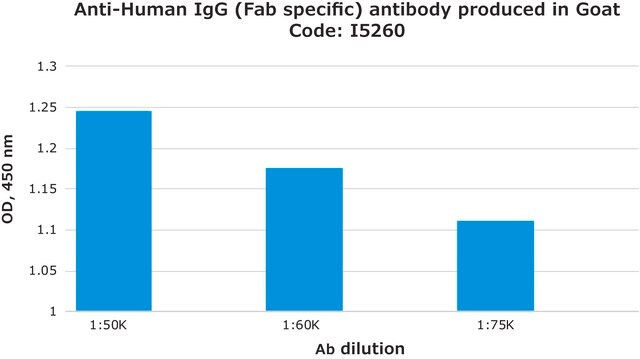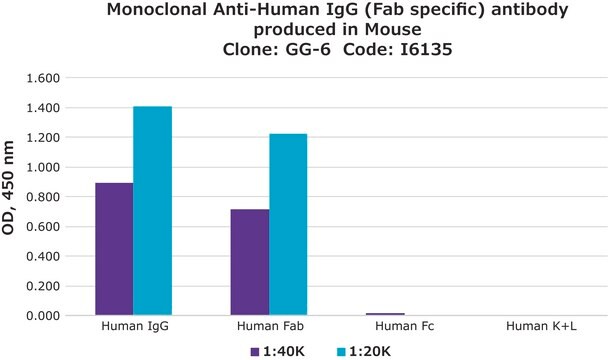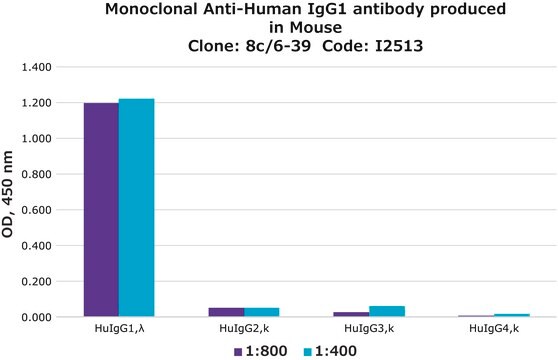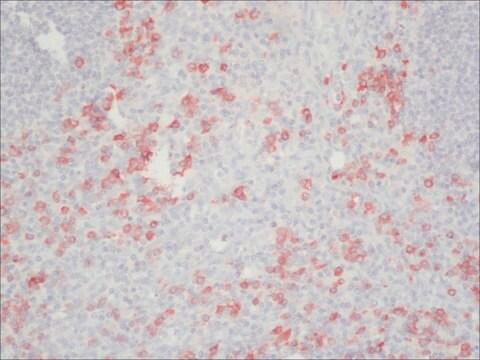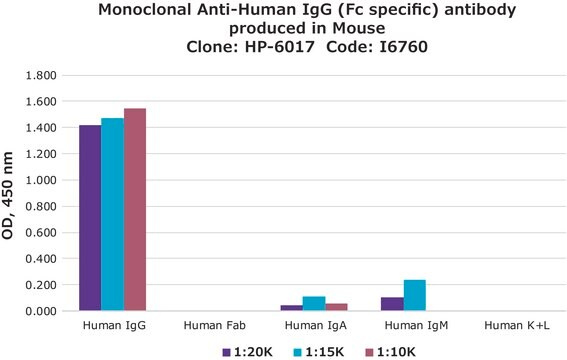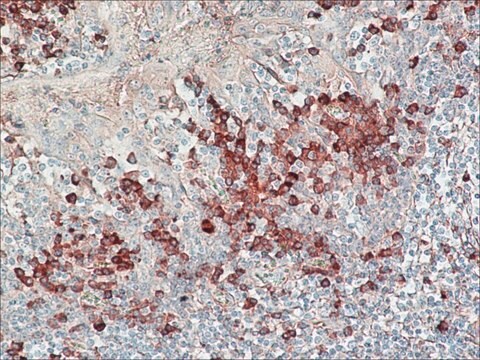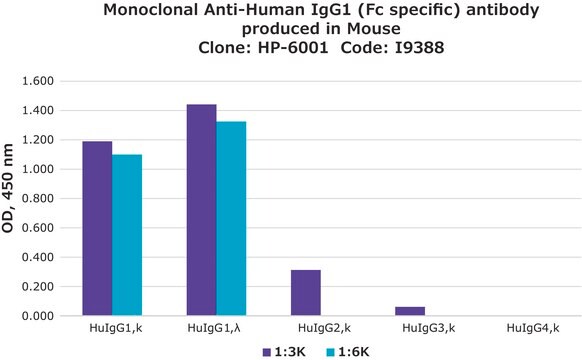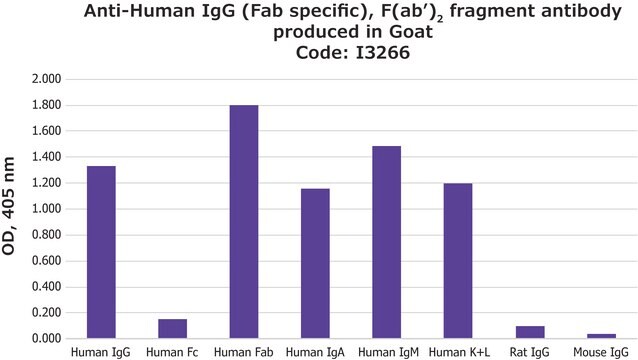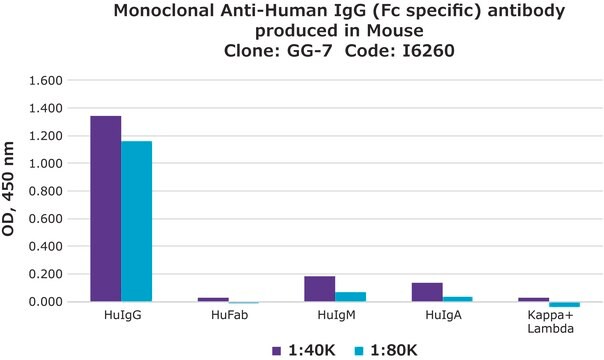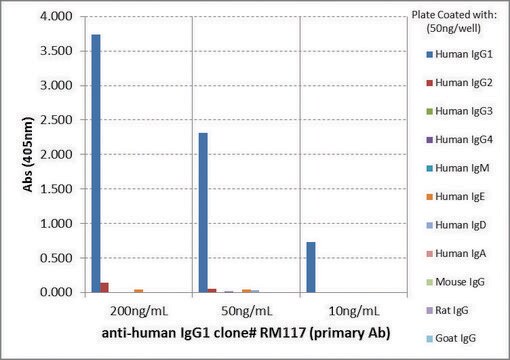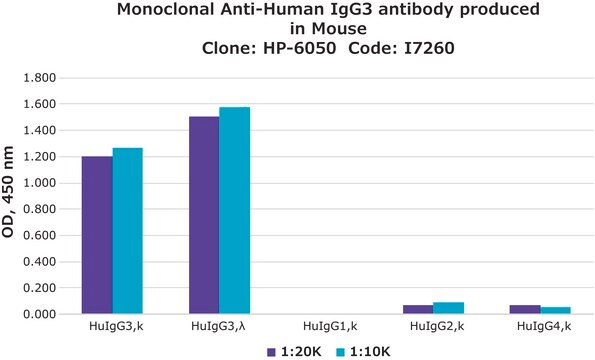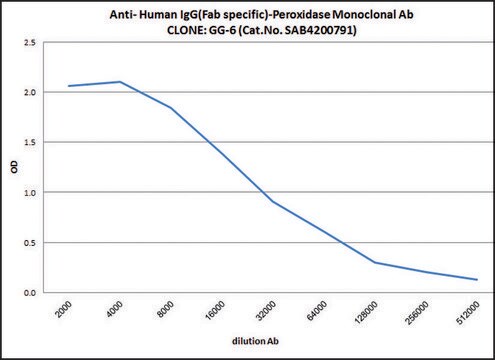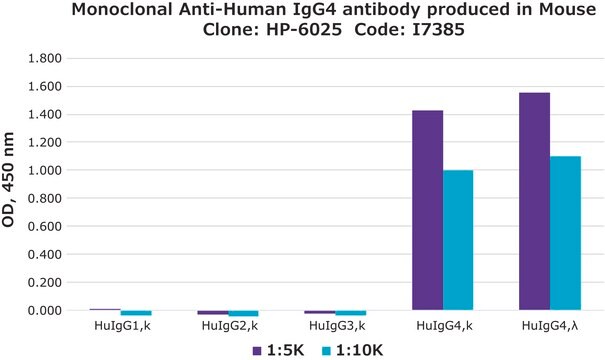I5385
Monoclonal Anti-Human IgG1 (Fab specific) [G1m(f)] antibody produced in mouse
clone SG-16, ascites fluid
Faça loginpara ver os preços organizacionais e de contrato
About This Item
Produtos recomendados
fonte biológica
mouse
Nível de qualidade
conjugado
unconjugated
forma do anticorpo
ascites fluid
tipo de produto de anticorpo
secondary antibodies
clone
SG-16, monoclonal
contém
15 mM sodium azide
técnica(s)
indirect ELISA: 1:5,000
Isotipo
IgG1
Condições de expedição
dry ice
temperatura de armazenamento
−20°C
modificação pós-traducional do alvo
unmodified
Descrição geral
Monoclonal Anti-Human IgG1 (mouse IgG1isotype) is derived from the hybridoma produced by the fusion of mouse myeloma cells and splenocytes from an immunized mouse. Human IgGs are glycoprotein antibodies that contain two equivalent light chains and a pair of identical heavy chains. IgGs have four distinct isoforms, ranging from IgG1 to IgG4.
Imunogênio
Purified human IgG
Aplicação
Monoclonal anti-Human IgG1 may be used for the identification of human IgG1 subclass by means of various immunoassays. It can be used in direct hemagglutination (HA) and hemagglutination inhibition (HAI) assays, immunofluorometric assay (IFMA) and detection of cytoplasmic IgG. Monoclonal anti-human IgG1 has been used in enzyme linked immunosorbent assay (ELISA).
Ações bioquímicas/fisiológicas
Human IgGs regulate immunological responses to allergy and pathogenic infections. IgGs have also been implicated in complement fixation and autoimmune disorders This product clone recognizes the G1m(f) allotype and has been established as a useful human IgG1 specificity standard by the WHO/IUIS study.
Exoneração de responsabilidade
Unless otherwise stated in our catalog or other company documentation accompanying the product(s), our products are intended for research use only and are not to be used for any other purpose, which includes but is not limited to, unauthorized commercial uses, in vitro diagnostic uses, ex vivo or in vivo therapeutic uses or any type of consumption or application to humans or animals.
Não está encontrando o produto certo?
Experimente o nosso Ferramenta de seleção de produtos.
Código de classe de armazenamento
10 - Combustible liquids
Classe de risco de água (WGK)
nwg
Ponto de fulgor (°F)
Not applicable
Ponto de fulgor (°C)
Not applicable
Escolha uma das versões mais recentes:
Já possui este produto?
Encontre a documentação dos produtos que você adquiriu recentemente na biblioteca de documentos.
Os clientes também visualizaram
Allotype analysis to distinguish the origin of varicella-zoster virus immunoglobulin G after allogeneic stem cell transplantation
Yamazaki R, et al.
Biology of Blood and Marrow Transplantation : Journal of the American Society For Blood and Marrow Transplantation, 19(7), 1013-1020 (2013)
Andreas Lossius et al.
Annals of clinical and translational neurology, 4(10), 756-761 (2017-10-20)
Immunoglobulin gamma (IgG) heavy chain genes are associated with susceptibility to multiple sclerosis (MS) and IgG levels in the cerebrospinal fluid (CSF). However, how these variants are implicated in disease mechanisms remains unknown. Here, we show that proliferating plasmablasts expressing
Recurrence of monoclonal gammopathy associated with donor-derived myelodysplastic syndrome after cord blood stem cell transplantation
Yamazaki R, et al.
Experimental Hematology, 39(12), 1119-1123 (2011)
Virginie Martin et al.
Veterinary research, 45, 69-69 (2014-06-27)
Control of canine leishmaniasis is an important objective for the benefit of dogs living in or visiting endemic areas and for public health because of the zoonotic nature of this disease. Resistance or susceptibility to developing canine leishmaniasis after exposure
Rie Yamazaki et al.
Experimental hematology, 39(12), 1119-1123 (2011-09-14)
Myelodysplastic syndrome (MDS) is known to be associated with functional abnormalities of B cells, including hypergammaglobulinemia and monoclonal gammopathy (MG). However, the pathogenesis of these immunological disorders has not been clarified. We report a patient who developed donor-derived MDS followed
Nossa equipe de cientistas tem experiência em todas as áreas de pesquisa, incluindo Life Sciences, ciência de materiais, síntese química, cromatografia, química analítica e muitas outras.
Entre em contato com a assistência técnica